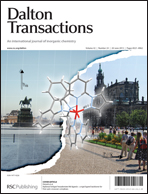Chemical and electrochemical oxidation of [Rh(β-diketonato)(CO)(P(OCH2)3CCH3)]: an experimental and DFT study
Abstract
An experimental and computational chemistry study of the reactivity of [Rh(β-diketonato)(CO)(P(OCH2)3CCH3)] complexes towards chemical and electrochemical
![Graphical abstract: Chemical and electrochemical oxidation of [Rh(β-diketonato)(CO)(P(OCH2)3CCH3)]: an experimental and DFT study](/en/Image/Get?imageInfo.ImageType=GA&imageInfo.ImageIdentifier.ManuscriptID=C3DT50310K&imageInfo.ImageIdentifier.Year=2013)

 Please wait while we load your content...
Please wait while we load your content...